Sunday September 27th, 2026
Berlin, Germany
Distance: Marathon
Offical Race Web Site
The story of the BERLIN-MARATHON is a story of the development of road running. When the first BERLIN-MARATHON was started on 13th October 1974 on a minor road next to the stadium of the organisers‘ club SC Charlottenburg Berlin 286 athletes had entered. The first winners were runners from Berlin: Günter Hallas (2:44:53), who still runs the BERLIN-MARATHON today, and Jutta von Haase (3:22:01).
It was not until 1980 that the marathon route led the runners along the Grunewald, a forest in West Berlin. The maximum participation in those days was 397 in 1976. But already during the early stages there was a world record. In 1977 the national marathon championships were held at the event for the first time. Women’s winner Christa Vahlensieck set a new world best clocking 2:34:47. It was also in 1977 when there was a reasonable good men’s winning time: British runner Norman Wilson won in 2:16:20.
September 27, 1981 was a big day for the organizers of the SC Charlottenburg. For the first time the BERLIN MARATHON was run through the city streets of West Berlin. The race was started in front of the Reichstag and finished on Kurfürstendamm. But it had been hard to persuade the local government and the police to move the race into the city.
Ian Ray (Great Britain/2:15:41) was the first winner. Angelika Stephan from Kassel (Germany) won the women’s race in 2:47:23. 3,486 runners from 30 nations participated in the race – the largest field ever in a marathon in Germany. Quality of the BERLIN MARATHON then improved from year to year. And numbers of participants strongly increased from 1981 onwards. In 1985 more than 10,000 entries were registered for the first time (11,814).
Starting on September 29, 2022 you can register for the 48th BMW BERLIN-MARATHON, which will take place onSeptember 24, 2023.
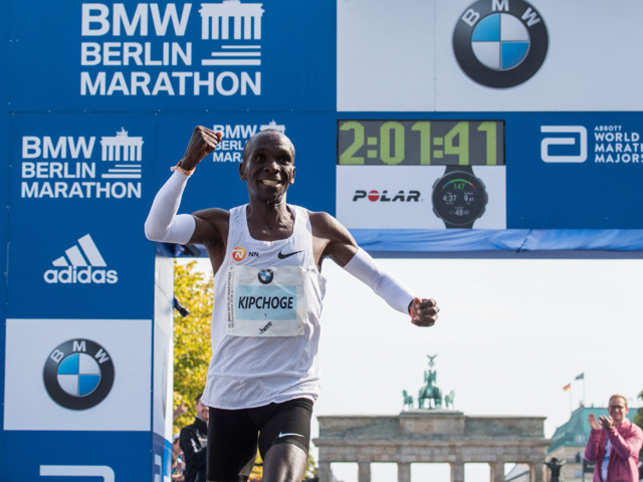
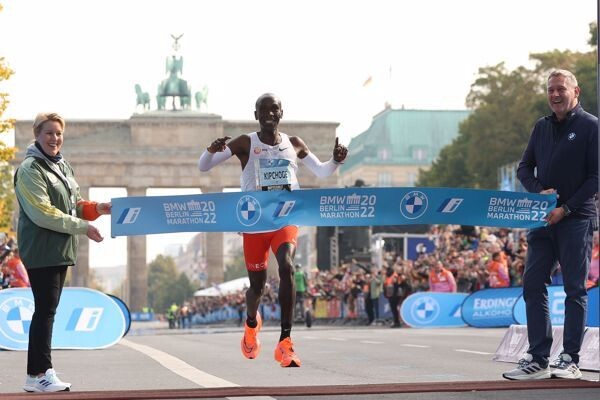
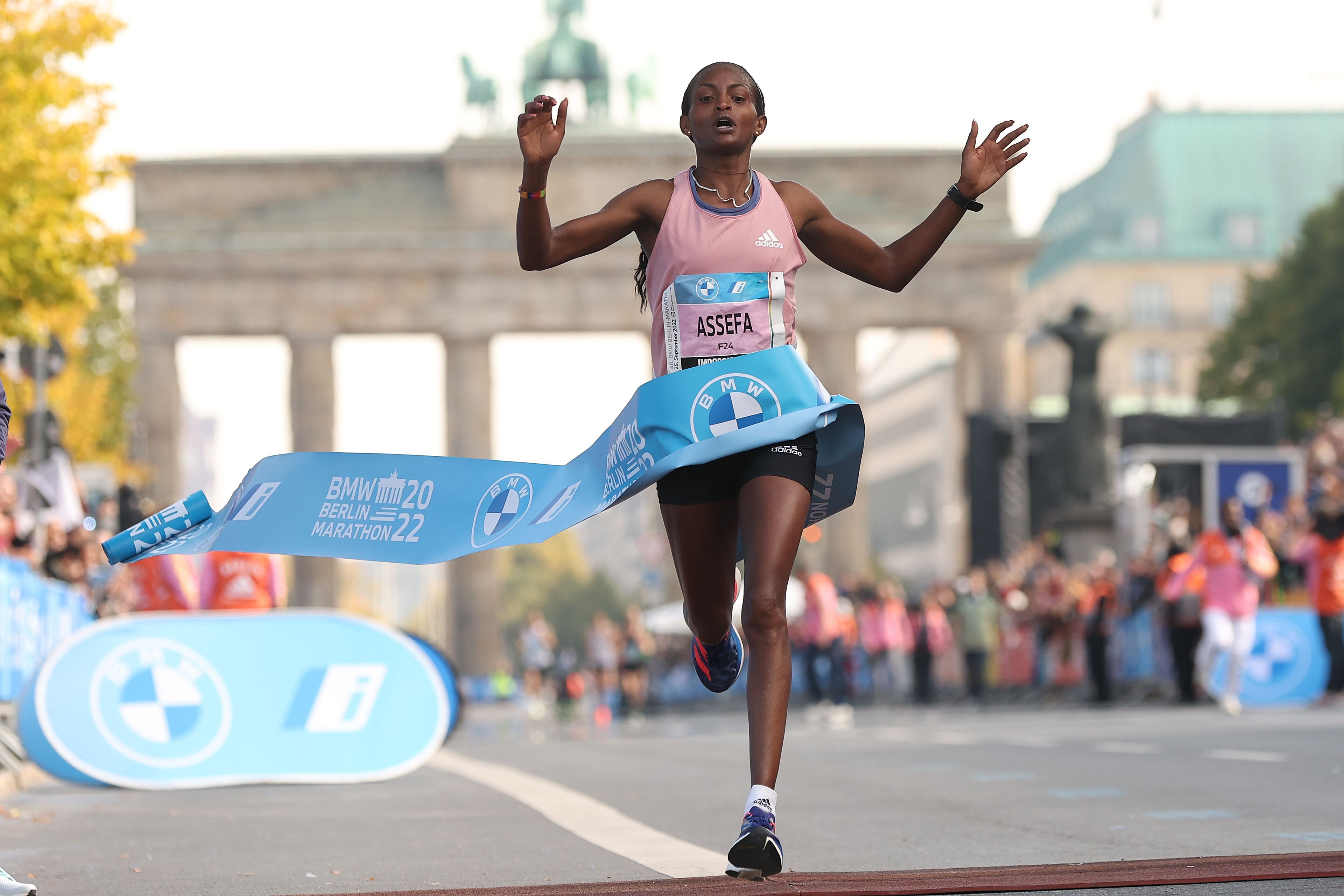
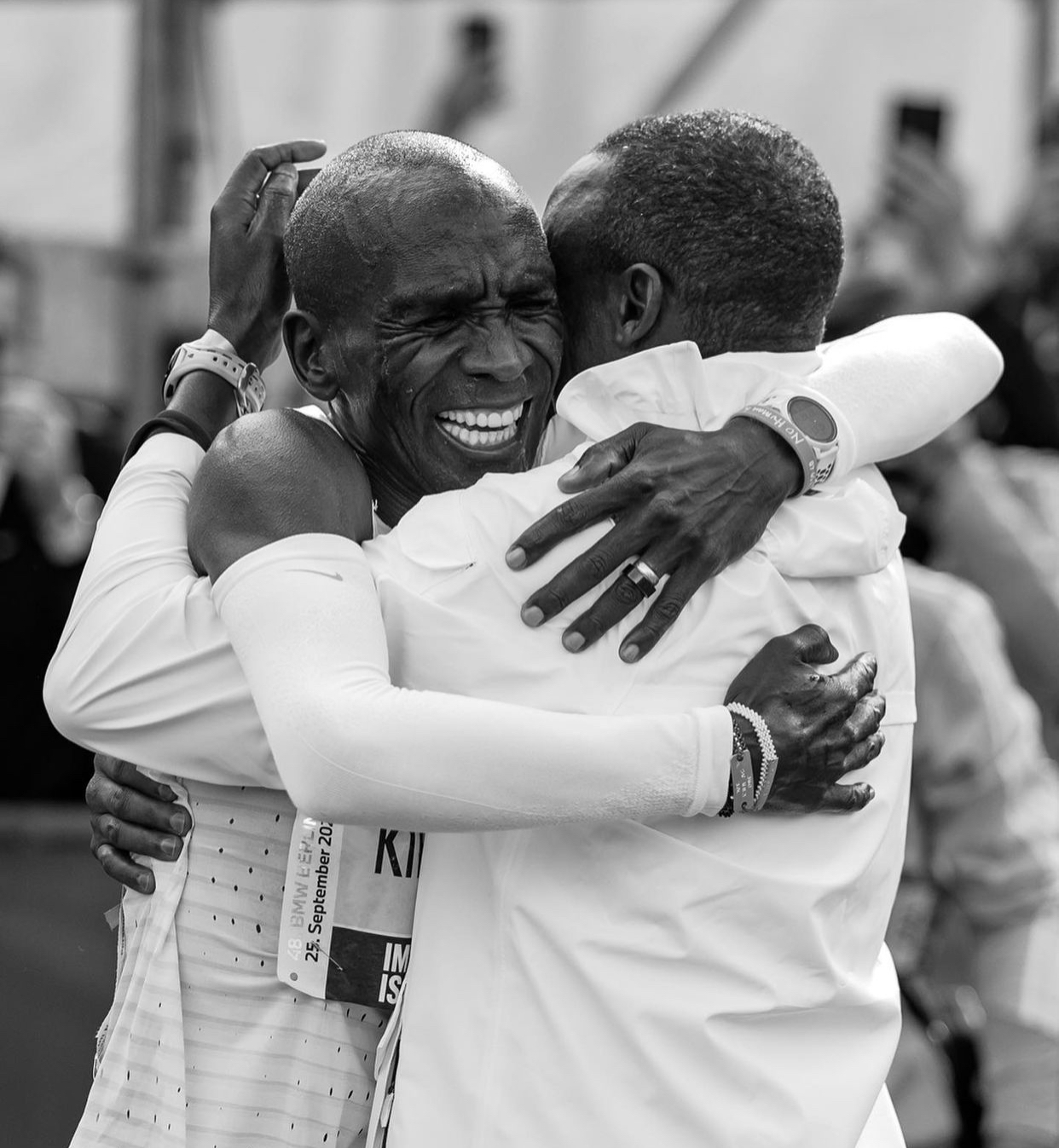
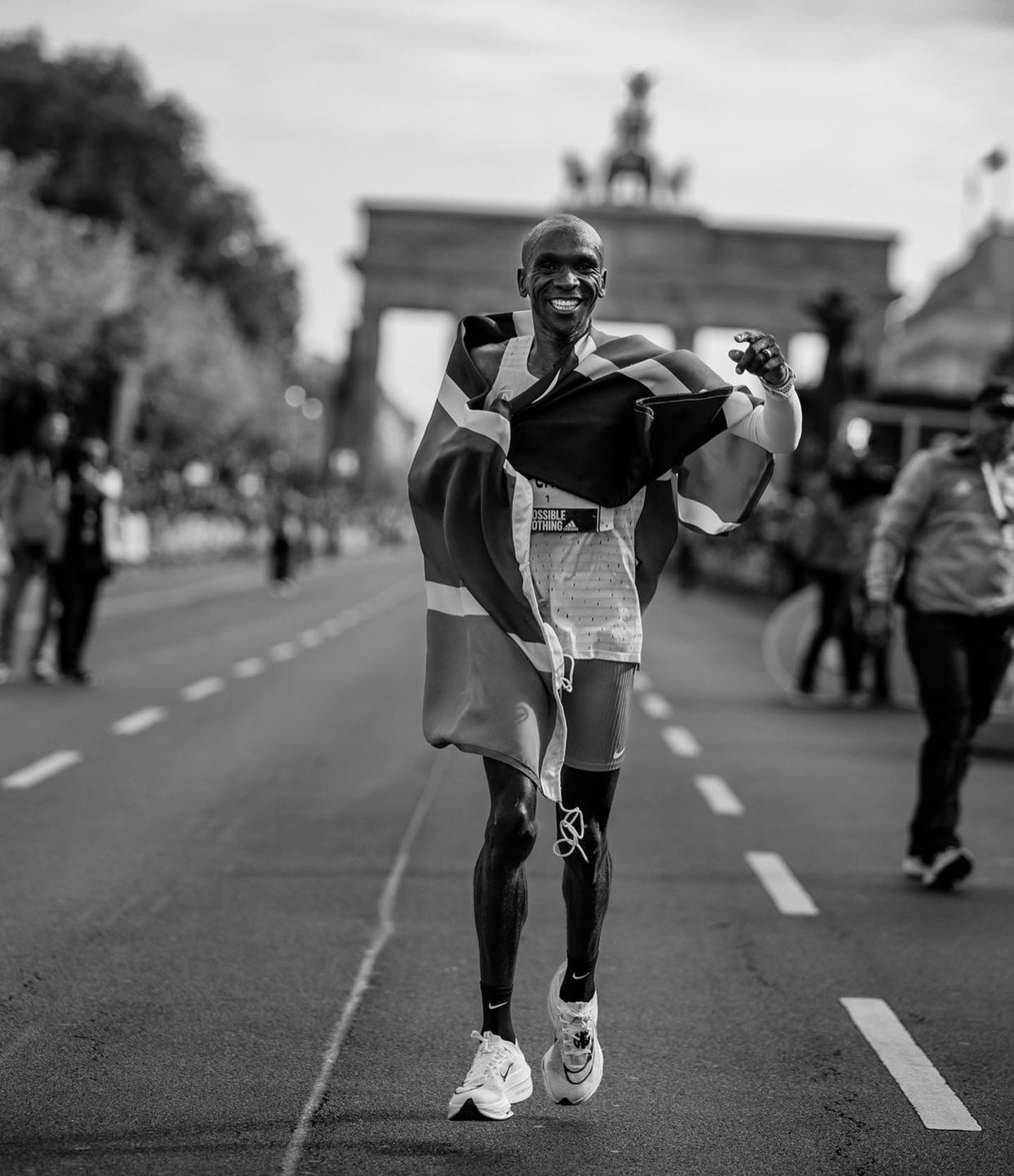
Kipchoge clocks 2:01:09 to set new world record Sept 25, 2022
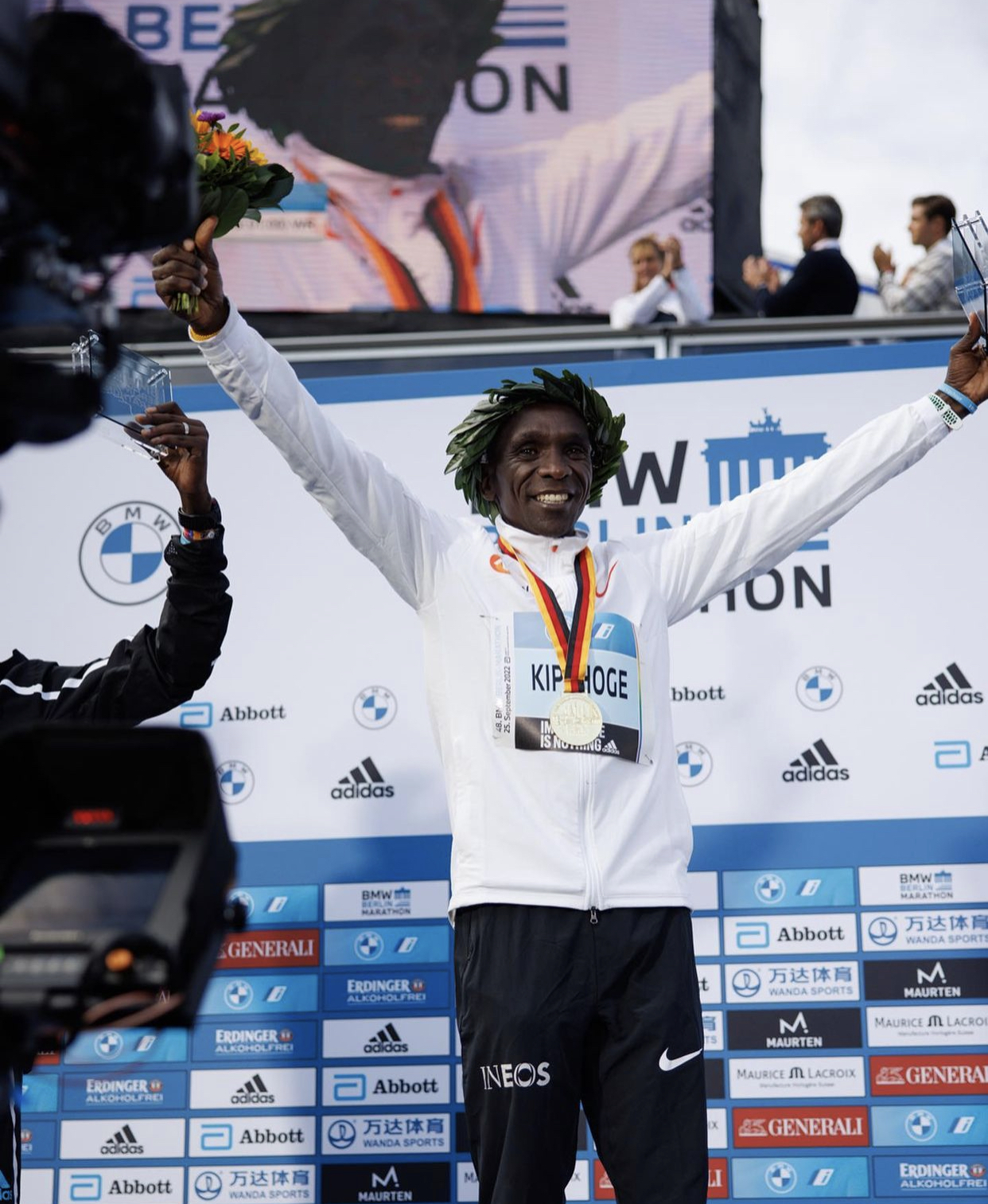
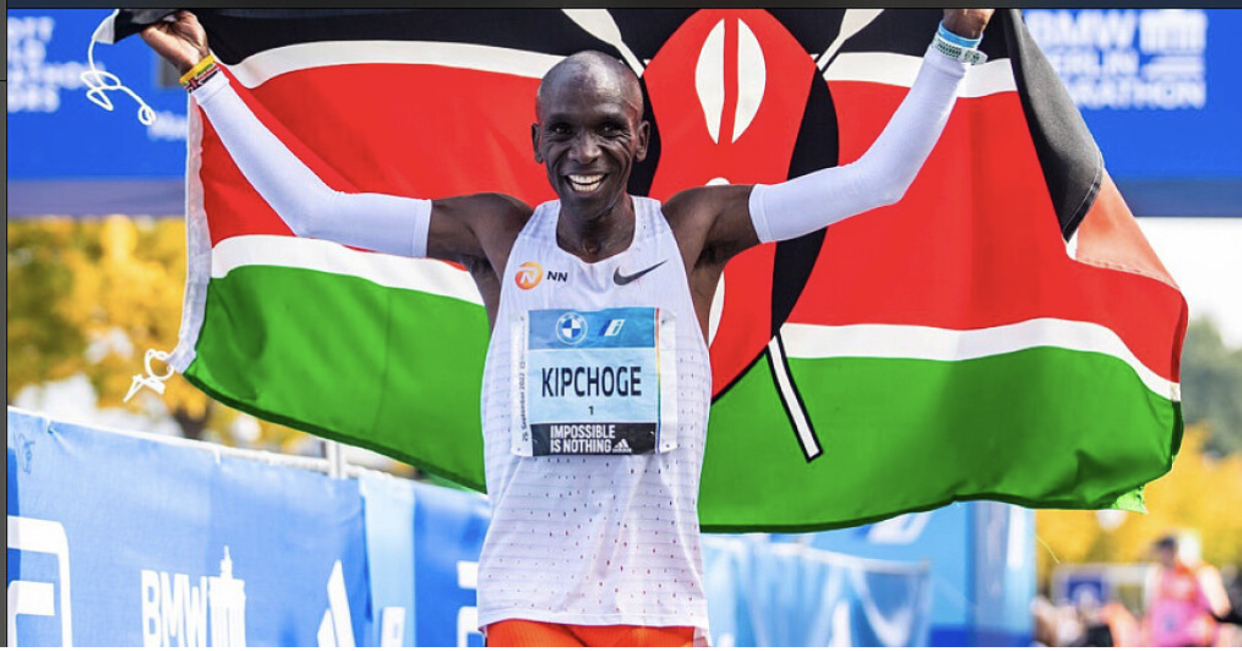
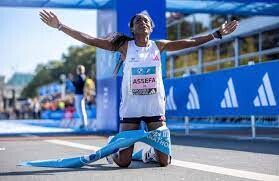
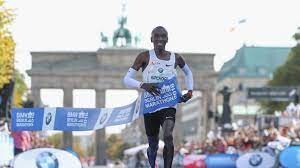
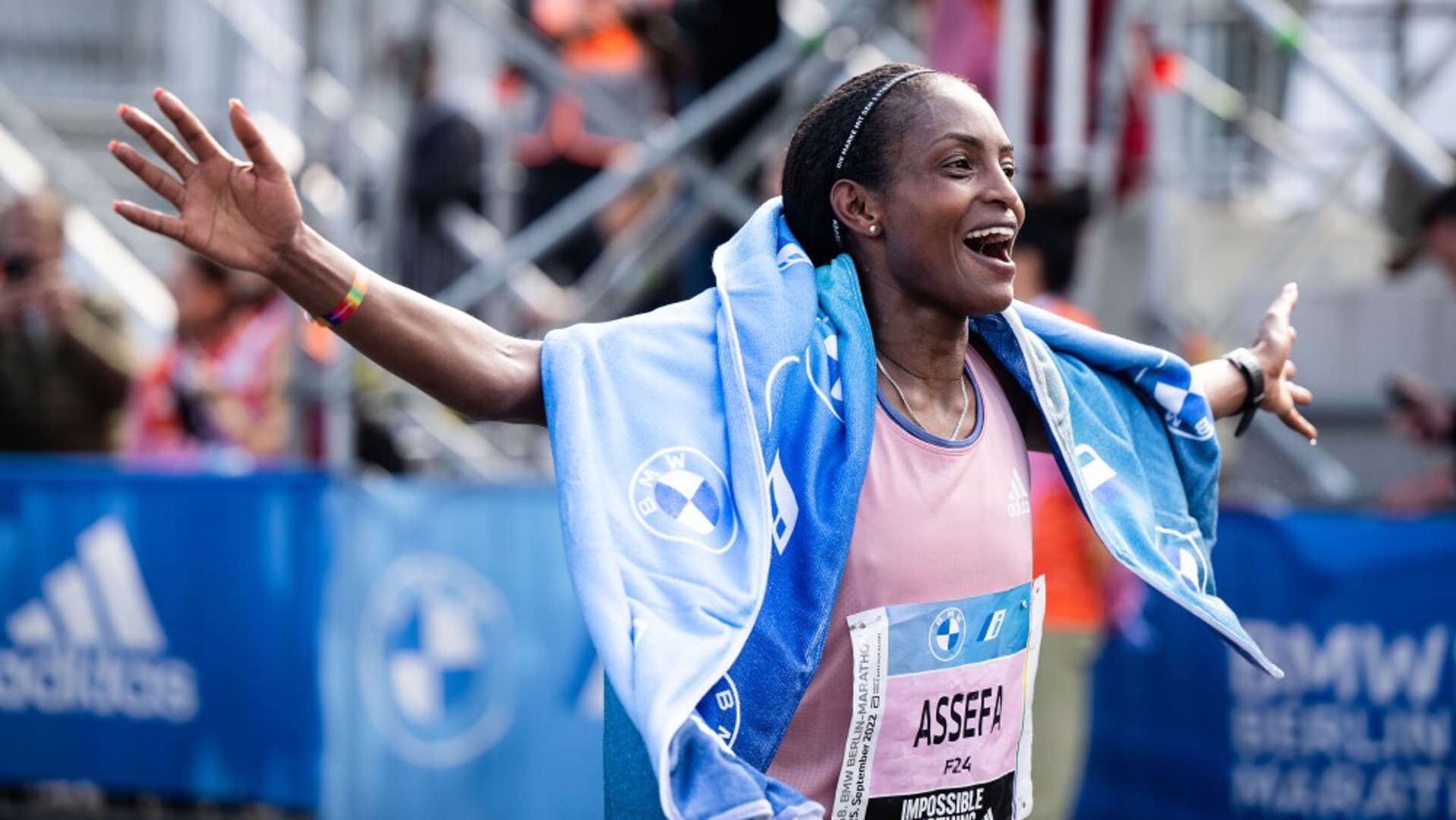
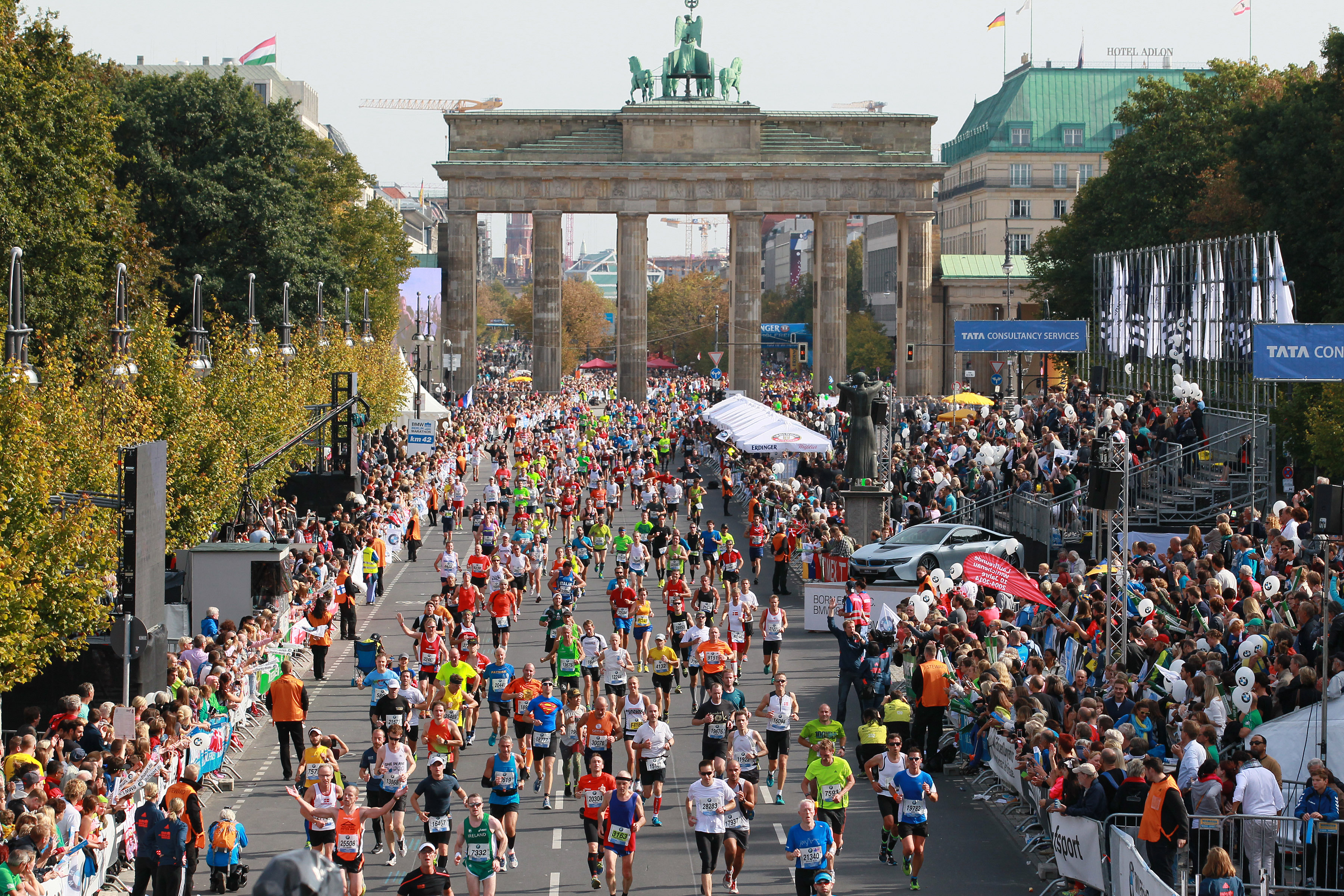
Race City Location Map - zoom in · zoom out · big map
displays approximate race location ·
My Best Runs Comments
What an outstanding race. They battled it out and in the end it took the second fastest time ever to win it. Congrats! And look at the 40-49 age group. It took 2:10 to be that age-group winner.
| Division | Time | Name | Age | Home |
| Male | 2:02:16 | Sabastian Sawe | ken | |
| 2nd Male | 2:06:15 | Akira Akasaki | jpn | |
| 3rd Male | 2:06:57 | Chimdessa Debele | ethi | |
| 4th Male | 2:07:11 | Guye Adola | ethi | |
| Female | 2:21:05 | Rosemary Wanjiru | ken | |
| 2nd Female | 2:21:08 | Dera Dida | ethi | |
| 3rd Female | 2:21:29 | Azmera Gebru | ethi | |
| 4th Female | 2:21:40 | Viola Cheptoo | ken |
| Division | Time | Name | Age | Home |
| M 40-49 | 2:20:12 | Abdeselam Mohamed | esp | |
| M 50-59 | 2:31:09 | Mohamed, Mustafa | esp | |
| M 60-69 | 2:45:14 | Rondole, Joël | fra | |
| M 70+ | 3:11:42 | Butler, David | gbr | |
| F 40-49 | 2:36:06 | Rivilla Arias | esp | |
| F 50-59 | 3:01:08 | Petersen, Helle | den | |
| F 60-69 | 3:17:12 | Murdy, Jackie | gbr | |
| F 70+ | 3:52:28 | Gordon, Yuko | gbr |

2022 - Eliud Kipchogesliced half a minute from his own world record to win the BMW Berlin Marathon, clocking a sensational 2:01:09 at the World Athletics Elite Platinum Label road race on Sunday (25).
There was also a stunning breakthrough for Ethiopia’s Tigist Assefa in the women’s race as she smashed the course record by more than two minutes with 2:15:37, becoming the third-fastest woman in history.
Just when it seemed Kipchoge had achieved everything he possibly could over the classic distance, the legendary pushed the world record further out of reach for the rest of the distance-running world.
Unlike his last world record run, the double Olympic champion went out hard on this occasion, passing through 5km in 14:14 and 10km in 28:22 – not just comfortably inside world record pace, but also well inside a projected two-hour finish.
Kipchoge maintained that pace through half way, which was reached in 59:50, but his pace started to drop slightly from then on, and by 25km (1:11:08) his projected finish had slipped to just outside two hours – still more than a minute inside world record pace, though.
Ethiopia’s Andamlak Belihu was just about staying level with Kipchoge up until this point, but the Kenyan superstar then gradually pulled clear and was out on his own.
He passed through 30km in 1:25:40, then reached 35km in 1:40:10. By the time he passed through 40km in 1:54:53, his lead had grown to move than four minutes with Mark Korir having moved into second place.
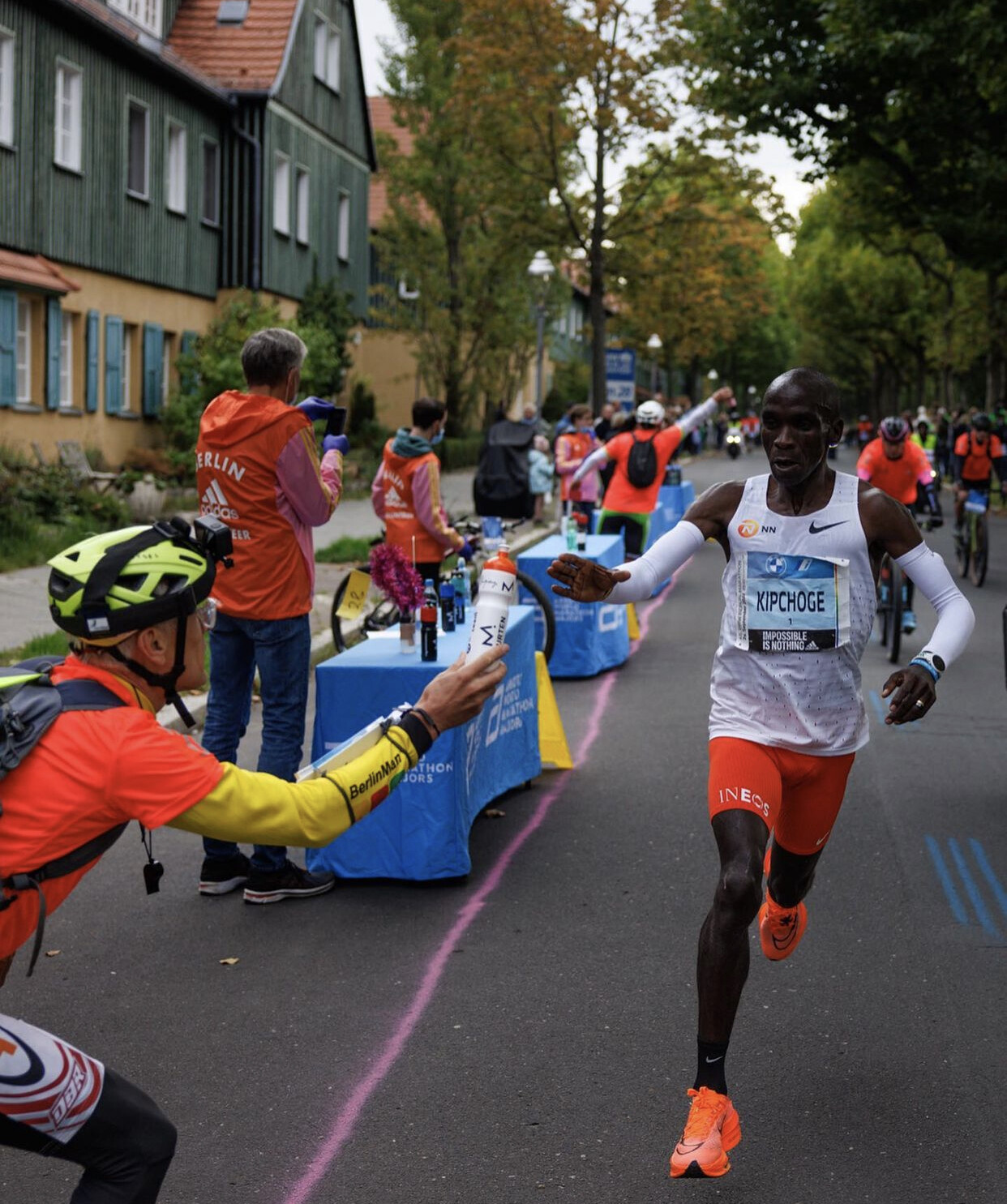
His victory – and world record – nor a formality, Kipchoge went on to cross the line in 2:01:09, taking 30 seconds off the world record he set in the German capital four years ago. Korir held on to second place in 2:05:58 and Ethiopia’s Tadu Abate came through to finish third in 2:06:28.
"I am overjoyed to have broken the world record in Berlin," said Kipchoge. "I wanted to run the first half so fast. No limitations.
"After 38km I knew I would be capable of breaking the world record. The circumstances were great, and so was the organisation of the event. I’m really happy with today and impressed by the fans and their support."
By contrast, several runners were in contention for most of the women’s race. A group of six women passed through half way in 2:08:13 – well inside course record pace – but by 30km, reached in 1:36:41, just three women remained at the front: Assefa, along with Ethiopian compatriots Tigist Abayechew and Meseret Gola.
Despite running significantly quicker than she ever had done before, Assefa – a former 800m specialist – maintained her relentless pace and opened up a gap of about 20 seconds by 35km.
She continued to pull away from the rest of the field and crossed the line in an Ethiopian record of 2:15:37 – a time that has only ever been beaten by world record-holders Brigid Kosgei (2:14:04) and Paula Radcliffe (2:15:25).
Kenya’s marathon debutante Rosemary Wanjiru came through to take second place in 2:18:00, finishing just three seconds ahead of Abayechew.
Leading results
Women
1. Tigist Assefa (ETH) 2:15:372
2. Rosemary Wanjiru (KEN) 2:18:003
3. Tigist Abayechew (ETH) 2:18:034
4. Workenesh Edesa (ETH) 2:18:515
5. Meseret Gola (ETH) 2:20:586
6. Keira D'Amato (USA) 2:21:487
7. Rika Kaseda (JPN) 2:21:558
8. Ayuko Suzuki (JPN) 2:22:029
9. Sayaka Sato (JPN) 2:22:1310
10. Vibian Chepkirui (KEN) 2:22:21
Men
1. Eliud Kipchoge (KEN) 2:01:092
2. Mark Korir (KEN) 2:05:583
3. Tady Abate (ETH) 2:06:284
4. Andamlak Belihu (ETH) 2:06:405
5. Abel Kipchumba (KEN) 2:06:496
6. Limenih Getachew (ETH) 2:07:077
7. Kenya Sonota (JPN) 2:07:148
8. Tatsuya Maruyama (JPN) 2:07:509
9. Kento Kikutani (JPN) 2:07:5610
10. Zablon Chumba (KEN) 2:08:01
(2021) BERLIN, Sept 26 Ethiopian Guye Adola survived a midway comeback from race favourite Kenenisa Bekele and a late surge from Kenyan Bethwel Yegon to power to victory in the Berlin marathon on Sunday.
Yegon finished in second place ahead of Bekele, who was competing for the first time in 18 months and struggled with a COVID-19 infection nine months ago, in third.
In an Ethiopian treble, Gotytom Gebreslase won the women's race in her debut marathon in two hours, 20 minutes and nine seconds, leaving Hiwot Gebrekidan in second place and Helen Tola in third.
There was no world record this time at the flat inner-city course but there was enough suspense and excitement before Adola crossed the finish line in an official time of two hours, five minutes and 45 seconds for the biggest win of his career.
The Ethiopian, along with countrymen Adola and Tefsaye Lencho, was three seconds quicker than the world's best mark set after the opening seven kilometres on a sun-drenched and warm autumn day.
The 39-year-old Bekele, who was two seconds off the world record in 2019 in Berlin for the second fastest-ever marathon run, was still on world record pace after 15km before dropping some 100 metres behind.
While Bekele refused to continue at that pace, Adola stayed with the group of four runners that included Kenyans Abraham Kipyatich and Philemon Kacheran.
One by one Adola's rivals then started to peel off, leaving the 30-year-old in charge and Bekele in second.
After 35 kilometres Bekele could no longer keep up but Adola still had to survive a late surge from outsider Yegon with four kilometres left as the Kenyan tried to surprise him with a strong finish.
But Adola pulled away to cruise to victory, leaving Yegon in second place and Bekele, who had contracted COVID-19 nine months ago and had not run competitively in 18 months, in third.
(2019) Bekele missed the world record by two seconds
EthiopianKenenisa Bekelewon the Berlin Marathon in 2:01:41, the second-fastest time in history, on Sunday.
Bekele, 37, missed KenyanEliud Kipchoge‘s world record, set in Berlin last year, by two seconds.
Kipchoge skipped Berlin this year to attempt a special sub-two-hour marathon in October in Vienna, not under record-eligible conditions.
Former Olympic and world champion Kenenisa Bekele staged a thrilling comeback on Sunday, dramatically missing the world record by two seconds.
Ethiopian Bekele, winner in Berlin in 2016 and world record holder over 5,000 and 10,000 meters, finished in two hours, one minute and 41 seconds, agonizingly close to Eliud Kipchoge's world record time despite a full sprint in the final 400 meters.
"I felt a little pain in the beginning so I dropped behind," Bekele told reporters. "After a few kilometers I started relaxing so I tied to push a little bit.
"I am very sorry. I am not lucky. I am very happy running my personal best. But I still can do this (world record). I don't give up. It is encouraging for the future."
Bekele was part of a group, including fellow countrymen Birhanu Legese and Sisay Lemma, that quickly broke from the pack with a quick pace.
Legese, winner of this year's Tokyo marathon, then gradually shook off Bekele and then Lemma after the 30km mark.
But Bekele battled back, leaving Lemma in his wake and then reined in Legese to cruise ahead but missed the world record time by two seconds despite a thrilling sprint toward the finish line.
"I was recovering (from injury) only three months ago. My preparation was not 100%. Fantastic result but I feel sorry missing marathon record by two seconds," Bekele said.
Legese took second place in 2:02:48, becoming the third fastest marathon runner ever. Lemma was third, another 48 seconds behind.
In the women's race Ethiopian Ashete Bekere beat Mare Dibaba in a sprint to the finish to win with a time of 2:20:14 and complete the Ethiopian sweep.
(2018) Eliud Kipchoge wins dramatic race in Berlin with world record time
The 33-year-old took more than a minute off the previous best which was set by compatriot Dennis Kimetto when he ran 2:02:57 in Berlin in 2014.
"I lack words to describe this day," said Kipchoge. "I am really grateful, happy to smash the world record."
He won the London Marathon for a third time earlier this year and is the Olympic champion over the distance.
"It was hard," Kipchoge added. "I ran my own race, I trusted my trainers, my programme and my coach. That's what pushed me in the last kilometres."
In a stunning display of distance running, Olympic champion Eliud Kipchoge broke the world record* at the BMW Berlin Marathon on Sunday (16), winning the IAAF Gold Label road race in 2:01:39.
From the early stages of the race, the 33-year-old Kenyan had just a handful of pacemakers for company as they passed through five kilometres in 14:24 and 10 kilometres in 29:21. But shortly after 15 kilometres, which was reached in 43:38, two of the three pacemakers were unable to continue and withdrew from the race.
The final pacemaker, Josphat Boit, led Kipchoge through the half-way point in 1:01:06 before dropping out at 25 kilometres, covered in 1:12:24.
Running alone with 17 kilometres left, Kipchoge then sped up.
He passed the 35-kilometre checkpoint just a shade outside 1:41:00, suggesting a finishing time inside 2:02 was possible. By 40 kilometres, reached in 1:55:32, a world record looked a certainty.
Kipchoge maintained his form well in the closing stages and crossed the finish line in 2:01:39, taking one minute and 18 seconds off the previous world record set four years ago by Dennis Kimetto. It is the largest single improvement on the marathon world record since Derek Clayton improved the mark by two minutes and 23 seconds in 1967.
"I lack the words to describe how I feel," said Kipchoge. "It was really hard [during the last 17 kilometres] but I was truly prepared to run my own race. I had to focus on the work I had put in in Kenya and that is what helped push me. I’m really grateful to my coaching team, my management, the organisation."
Amos Kipruto finished a distant second in 2:06:23 while former world record-holder Wilson Kipsang was third in 2:06:48.
Gladys Cherono made it a Kenyan double by winning the women's race in a course record of 2:18:11.
Multiple world and Olympic champion Tirunesh Dibaba led during the early stages, passing through half way in 1:09:03. Cherono, Ruti Aga, Edna Kiplagat and Helen Tola were close behind, and when Dibaba started to struggle a few kilometres later, Cherono moved into pole position.
Cherono, the winner in Berlin in 2015 and 2017, successfully defended her title in 2:18:11, taking more than a minute off the course record set 13 years ago by Japan's Mizuki Noguchi.
Aga followed 23 seconds later to take second place in 2:18:34 while Dibaba held on for third place in 2:18:55. It was the first marathon in history in which three women finished inside 2:19.
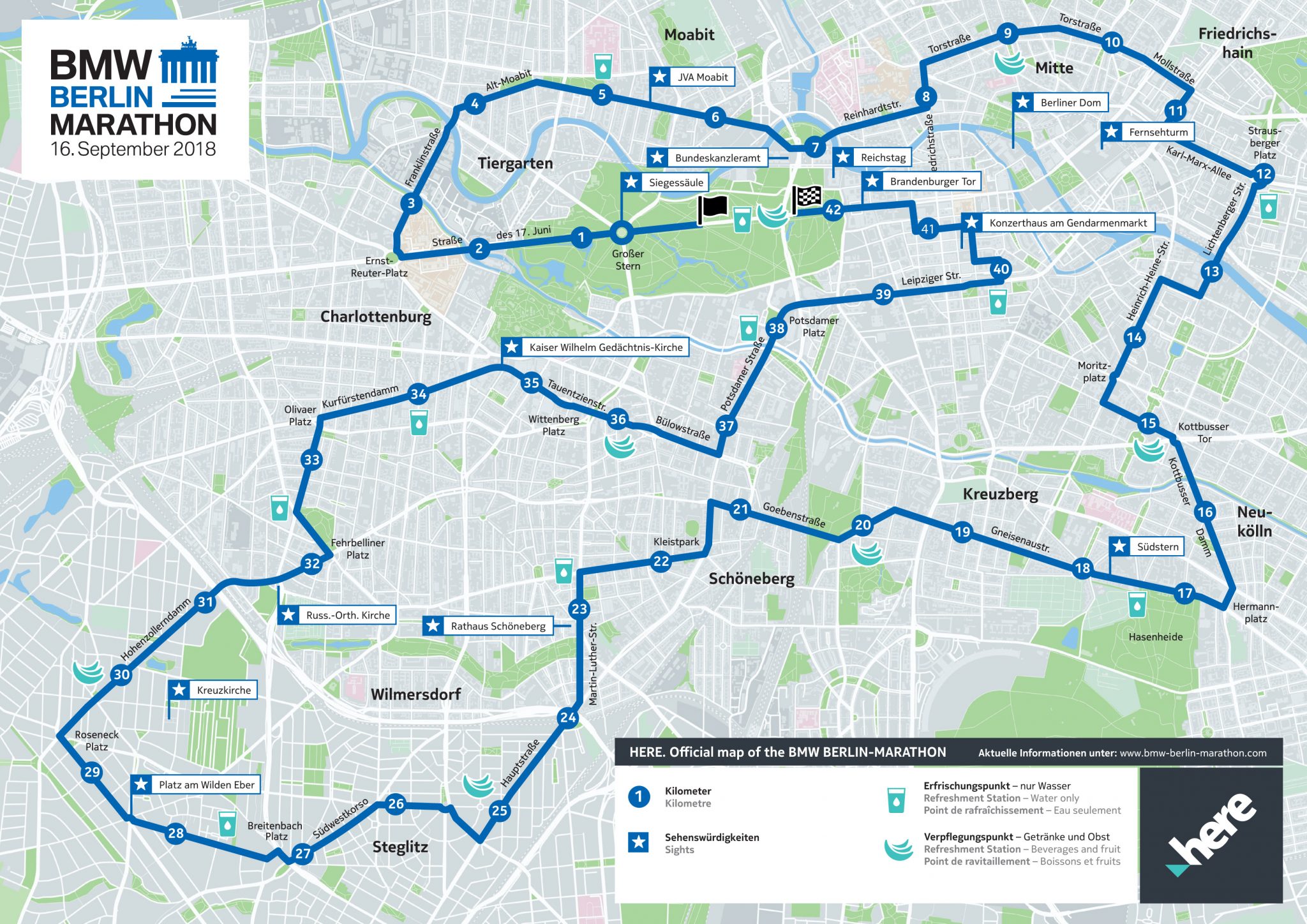








Hello! Thanks for BMW Berlin Marathon to make the runner Rich we will be this year there